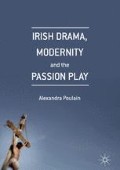Abstract
In this chapter, I look at Pearse’s plays Passion Play (1911), The King (1912), Owen (1913), The Master (1915) and The Singer (1917) and, refuting the oft-repeated notion that Pearse’s recurrent treatment of the theme of the Passion proceeds from a morbid (or morbidly eroticised) fixation with death and blood sacrifice, I study the relationship between Pearse’s politics, educational practice and theatrical experimentation, and argue that he uses the tropes and the dramaturgy of the Passion pragmatically, as the forms ideally suited to promote his revolutionary agenda. I also challenge another critical view which has emerged in recent Pearse scholarship, according to which the plays both express Pearse’s illicit homosexual inclinations and attempt to camouflage them, ultimately working towards the stabilisation of traditional gender roles and the reinforcement of the hegemonic patriarchal order (Harris and Valente). Instead, I suggest that the masculinist discourse operating at surface level is complicated, indeed undermined, by the fluidity of gender positions which Pearse’s version of the Passion drama implicitly promotes.
Access this chapter
Tax calculation will be finalised at checkout
Purchases are for personal use only
Notes
- 1.
Pearse, Collected Plays. All further references to this edition are signalled parenthetically within the text.
- 2.
Typical examples of this line of argument include Thompson’s Imagination, Dudley Edwards’ Patrick Pearse, Kearney’s “Myth and Terror,” Dalton’s “The Tradition of Blood Sacrifice,” Moran’s Patrick Pearse and the Politics of Redemption and Rigney’s Embodied and Remembered Lives.
- 3.
See in particular Harris, Gender in Modern Irish Drama, 123–66 and Valente, Myth of Manliness, 99 sq.
- 4.
For more comprehensive accounts of revisionist assessments of Pearse’s life and works, see Böss, “Country of Light” and Keogh, “Patrick Pearse, Studies and the Birth of Revisionism.”
- 5.
Harris, Gender in Modern Irish Drama, 127–143 and Valente, Myth of Manliness, 100. The devastating psychic consequences of the discursive violence exerted in the form of this double bind are explored in depth in the context of India in Ashis Nandy’s seminal essay The Intimate Enemy: Loss and Recovery of Self under Colonialism.
- 6.
Mary Trotter’s chapter on “The Boys of St. Enda’s” in her Ireland’s National Theaters offers illuminating insights on the theatricality of everyday life at St. Enda’s, and on the performative dimension of Pearse’s death, yet she tends to read the plays themselves thematically rather than performatively, as theatre. Although her reading is more sympathetic than earlier revisionist approaches to Pearse’s drama, she nevertheless accepts the ideological implications of Thompson’s and Dudley Edwards’ paradigm of “blood sacrifice.”
- 7.
See Encyclopaedia Britannica, “Boy Bishop.”
- 8.
Pearse, The Coming Revolution, 27.
- 9.
Ibid., 29.
- 10.
Harris, Gender in Modern Irish Drama, 151.
- 11.
Edelman, No Future, 2–3.
- 12.
The passage paraphrases Lady Macbeth’s warning to Macbeth, “Yet do I fear thy nature,/It is too full o’ th’ milk of human kindness/To catch the nearest way.” (Shakespeare, Macbeth, 123).
- 13.
Valente, Myth of Manliness, 100.
Author information
Authors and Affiliations
Copyright information
© 2016 The Author(s)
About this chapter
Cite this chapter
Poulain, A. (2016). Anticipating the Rising: Pedagogy, Sacrifice and Theatre in Padraic Pearse’s Plays. In: Irish Drama, Modernity and the Passion Play. Palgrave Macmillan, London. https://doi.org/10.1057/978-1-349-94963-2_3
Download citation
DOI: https://doi.org/10.1057/978-1-349-94963-2_3
Published:
Publisher Name: Palgrave Macmillan, London
Print ISBN: 978-1-349-94962-5
Online ISBN: 978-1-349-94963-2
eBook Packages: Literature, Cultural and Media StudiesLiterature, Cultural and Media Studies (R0)

